英语第二单元计划
六年级英语上册第二单元教学计划
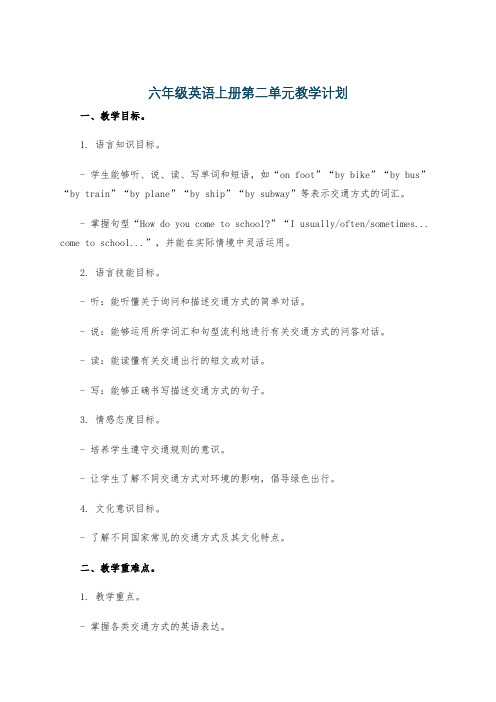
六年级英语上册第二单元教学计划一、教学目标。
1. 语言知识目标。
- 学生能够听、说、读、写单词和短语,如“on foot”“by bike”“by bus”“by train”“by plane”“by ship”“by subway”等表示交通方式的词汇。
- 掌握句型“How do you come to school?”“I usually/often/sometimes... come to school...”,并能在实际情境中灵活运用。
2. 语言技能目标。
- 听:能听懂关于询问和描述交通方式的简单对话。
- 说:能够运用所学词汇和句型流利地进行有关交通方式的问答对话。
- 读:能读懂有关交通出行的短文或对话。
- 写:能够正确书写描述交通方式的句子。
3. 情感态度目标。
- 培养学生遵守交通规则的意识。
- 让学生了解不同交通方式对环境的影响,倡导绿色出行。
4. 文化意识目标。
- 了解不同国家常见的交通方式及其文化特点。
二、教学重难点。
1. 教学重点。
- 掌握各类交通方式的英语表达。
- 学会运用句型“How do you come to school?”及其答语进行交流。
2. 教学难点。
- 正确区分“by + 交通工具”和“on foot”等不同表达的用法。
- 能够根据实际情况准确运用频率副词“usually”“often”“sometimes”等。
三、教学方法。
1. 情景教学法。
通过创设各种交通场景,如在马路上、车站等,让学生在真实情境中学习和运用交通方式的英语表达。
2. 任务驱动法。
布置任务,如调查同学们的上学交通方式并进行汇报,促使学生积极参与课堂活动,提高语言运用能力。
3. 交际教学法。
组织学生进行对话练习,鼓励学生互相交流上学或出行的交通方式,培养学生的口语交际能力。
四、教学资源。
1. 教材、练习册。
2. 多媒体设备,用于播放与交通方式相关的视频、图片等。
3. 单词卡片、交通标志卡片等教具。
一年级上册英语第二单元周教学计划
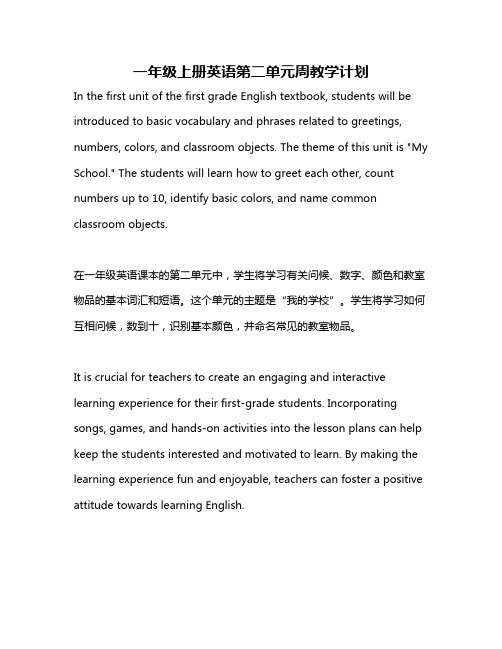
一年级上册英语第二单元周教学计划In the first unit of the first grade English textbook, students will be introduced to basic vocabulary and phrases related to greetings, numbers, colors, and classroom objects. The theme of this unit is "My School." The students will learn how to greet each other, count numbers up to 10, identify basic colors, and name common classroom objects.在一年级英语课本的第二单元中,学生将学习有关问候、数字、颜色和教室物品的基本词汇和短语。
这个单元的主题是“我的学校”。
学生将学习如何互相问候,数到十,识别基本颜色,并命名常见的教室物品。
It is crucial for teachers to create an engaging and interactive learning experience for their first-grade students. Incorporating songs, games, and hands-on activities into the lesson plans can help keep the students interested and motivated to learn. By making the learning experience fun and enjoyable, teachers can foster a positive attitude towards learning English.对于老师来说,为一年级学生创造一个引人入胜和互动的学习体验至关重要。
最新部编版四年级英语下册第二单元教案
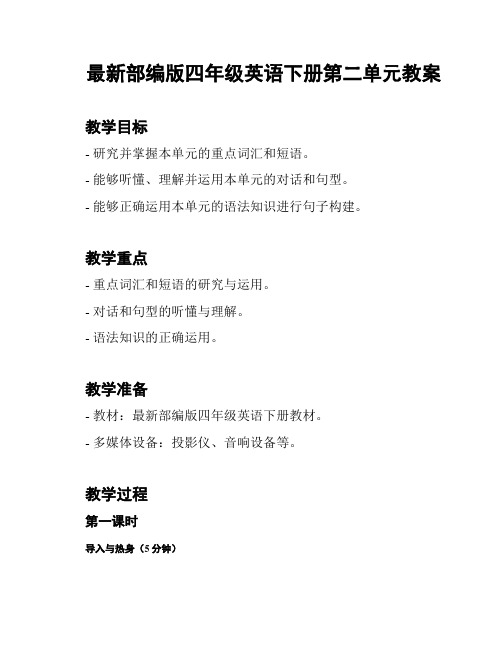
最新部编版四年级英语下册第二单元教案教学目标- 研究并掌握本单元的重点词汇和短语。
- 能够听懂、理解并运用本单元的对话和句型。
- 能够正确运用本单元的语法知识进行句子构建。
教学重点- 重点词汇和短语的研究与运用。
- 对话和句型的听懂与理解。
- 语法知识的正确运用。
教学准备- 教材:最新部编版四年级英语下册教材。
- 多媒体设备:投影仪、音响设备等。
教学过程第一课时导入与热身(5分钟)- 利用图片或实物引导学生讨论关于本单元的话题,激发学生研究的兴趣。
新课呈现(15分钟)- 利用多媒体设备呈现本单元的重点词汇和短语,并进行音、形、义的讲解。
对话研究(20分钟)- 带领学生听录音材料,理解对话内容。
- 分角色进行对话练,培养学生的口语表达能力。
语法讲解(10分钟)- 讲解本单元的语法知识,例如:一般现在时的用法和句子结构。
听力训练(10分钟)- 播放录音材料,让学生进行听力训练,理解对话内容。
第二课时复与巩固(10分钟)- 复前一课时所学的重点词汇和短语,进行口头巩固练。
对话拓展(20分钟)- 利用图片或实物,设计拓展对话,让学生进行角色扮演,增加语言运用的机会。
语法练(15分钟)- 给学生出示一些句子,让他们根据学到的语法知识进行句子构建。
听力训练(10分钟)- 播放录音材料,让学生进行听力训练,理解对话内容。
第三课时大结局(10分钟)- 小结本单元的重点词汇、短语、对话和语法知识。
小组活动(15分钟)- 分组活动,让学生运用所学知识创造对话,进行小组展示。
问题反馈和解答(10分钟)- 解答学生在研究过程中遇到的问题,帮助他们消除疑惑。
课后作业- 根据所学知识完成课后题。
- 准备下一单元的研究。
教学评价- 教师观察学生在听、说、读、写各方面的表现,并给予及时反馈。
- 课堂练的评价,例如对话表演的流利程度、语法知识的正确运用等。
教学扩展- 利用课后时间,鼓励学生进行相关的阅读或写作练,进一步巩固所学知识。
人教新目标九年级英语 unit 2单元整体教学设计模板
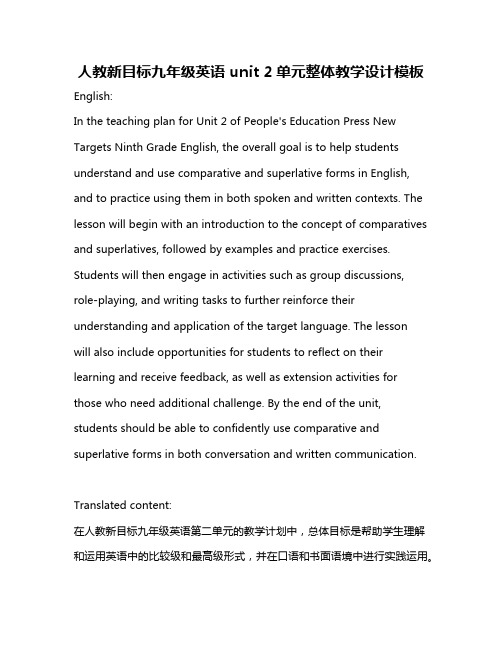
人教新目标九年级英语 unit 2单元整体教学设计模板English:In the teaching plan for Unit 2 of People's Education Press New Targets Ninth Grade English, the overall goal is to help students understand and use comparative and superlative forms in English, and to practice using them in both spoken and written contexts. The lesson will begin with an introduction to the concept of comparatives and superlatives, followed by examples and practice exercises. Students will then engage in activities such as group discussions,role-playing, and writing tasks to further reinforce their understanding and application of the target language. The lessonwill also include opportunities for students to reflect on their learning and receive feedback, as well as extension activities for those who need additional challenge. By the end of the unit, students should be able to confidently use comparative and superlative forms in both conversation and written communication.Translated content:在人教新目标九年级英语第二单元的教学计划中,总体目标是帮助学生理解和运用英语中的比较级和最高级形式,并在口语和书面语境中进行实践运用。
英语教师工作计划八下第二单元
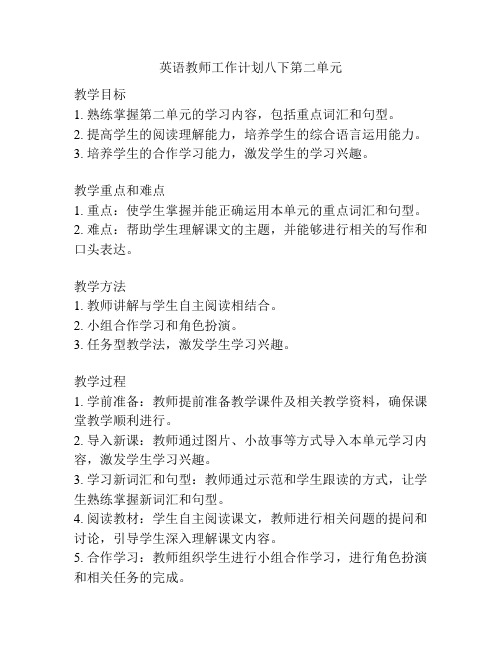
英语教师工作计划八下第二单元
教学目标
1. 熟练掌握第二单元的学习内容,包括重点词汇和句型。
2. 提高学生的阅读理解能力,培养学生的综合语言运用能力。
3. 培养学生的合作学习能力,激发学生的学习兴趣。
教学重点和难点
1. 重点:使学生掌握并能正确运用本单元的重点词汇和句型。
2. 难点:帮助学生理解课文的主题,并能够进行相关的写作和口头表达。
教学方法
1. 教师讲解与学生自主阅读相结合。
2. 小组合作学习和角色扮演。
3. 任务型教学法,激发学生学习兴趣。
教学过程
1. 学前准备:教师提前准备教学课件及相关教学资料,确保课堂教学顺利进行。
2. 导入新课:教师通过图片、小故事等方式导入本单元学习内容,激发学生学习兴趣。
3. 学习新词汇和句型:教师通过示范和学生跟读的方式,让学生熟练掌握新词汇和句型。
4. 阅读教材:学生自主阅读课文,教师进行相关问题的提问和讨论,引导学生深入理解课文内容。
5. 合作学习:教师组织学生进行小组合作学习,进行角色扮演和相关任务的完成。
6. 提高拓展:教师布置相关的写作和口头表达任务,提高学生的语言表达能力。
评价方式
1. 考试评价:通过课堂小测验和笔试考试的形式,检测对学生的学习情况进行评价。
2. 表现评价:通过学生课堂表现和作业情况,对学生的综合能力进行评价。
教学反思
教师需要不断调整教学方式和方法,关注学生的学习情况,及时调整教学计划,促进学生的全面发展。
英语第二单元星期计划短文

英语第二单元星期计划短文Next week, I have a pretty busy schedule planned. I will start off my Monday with a morning workout at the gym, followed by a healthy breakfast to kickstart my day.下周,我计划安排了一个相当忙碌的日程。
我将在星期一的早晨在健身房开始我的锻炼,然后吃一顿健康的早餐来开启我的一天。
After that, I have a few meetings lined up throughout the day, which will keep me occupied until the early evening. I'm looking forward to discussing some new ideas and projects with my colleagues.之后,我安排了一些会议,一直忙到傍晚。
我期待着和我的同事们讨论一些新的想法和项目。
On Tuesday, I have set aside some time to catch up on my reading. I have a few books that I have been meaning to dive into, and I'm excited to finally have some time to do so.星期二,我安排了一些时间来赶上我的阅读。
我有几本书一直想要深入研究,我很兴奋终于有些时间可以做到这一点。
Wednesday is going to be a more laid-back day for me. I plan to meet up with a friend for coffee and have a leisurely afternoon catching up and enjoying each other's company.星期三对我来说将是一个更加悠闲的日子。
部编版三年级上册英语第二单元单元备课(集体备课)
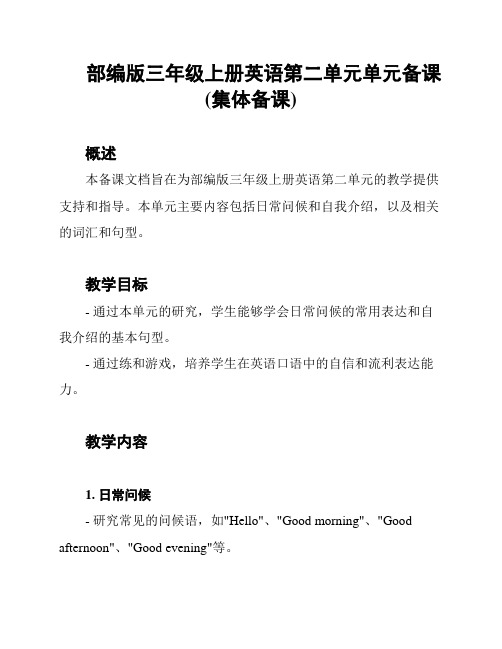
部编版三年级上册英语第二单元单元备课(集体备课)概述本备课文档旨在为部编版三年级上册英语第二单元的教学提供支持和指导。
本单元主要内容包括日常问候和自我介绍,以及相关的词汇和句型。
教学目标- 通过本单元的研究,学生能够学会日常问候的常用表达和自我介绍的基本句型。
- 通过练和游戏,培养学生在英语口语中的自信和流利表达能力。
教学内容1. 日常问候- 研究常见的问候语,如"Hello"、"Good morning"、"Good afternoon"、"Good evening"等。
- 研究如何回应问候,如"Hello"、"Good morning"、"Good afternoon"、"Good evening"等。
2. 自我介绍- 研究自我介绍的句型,如"My name is..."、"I am..."等。
- 研究介绍自己的年龄、家庭成员等相关内容。
教学计划第一课时:日常问候1. 师生互相问候,使用学过的问候语,并互相回答。
2. 听录音,模仿录音中的问候语,反复练。
3. 与同伴进行角色扮演,模拟真实对话中的日常问候。
第二课时:自我介绍1. 师生互相进行简单的自我介绍,使用学过的自我介绍句型。
2. 学生两两分组,互相进行自我介绍,并记录对方信息。
3. 学生向全班展示自己的小组成员的介绍。
教学评估1. 通过角色扮演和师生互动,评估学生在日常问候方面的表达能力。
2. 通过小组自我介绍的展示,评估学生在自我介绍方面的口语表达能力。
3. 给学生出示一些日常问候和自我介绍的图片,让学生按要求进行描述,评估他们的词汇掌握和语法运用能力。
教学资源1. 部编版三年级上册英语教材第二单元课本和练册。
2. 录音机或播放设备,用于播放问候和自我介绍的录音。
人教版PEP英语小学五年级上册第二单元教学计划和教案
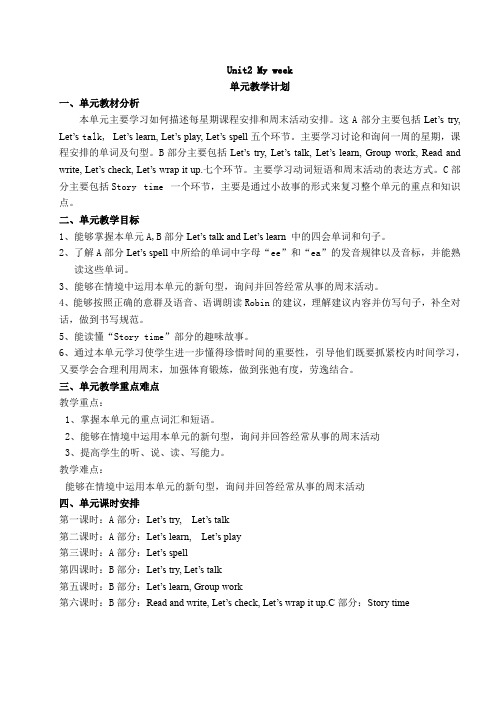
Unit2 My week单元教学计划一、单元教材分析本单元主要学习如何描述每星期课程安排和周末活动安排。
这A部分主要包括Let’s try, Let’s talk, Let’s learn, Let’s play, Let’s spell五个环节。
主要学习讨论和询问一周的星期,课程安排的单词及句型。
B部分主要包括Let’s try, Let’s talk, Let’s learn, Group work, Read and write, Let’s check, Let’s wrap it up.七个环节。
主要学习动词短语和周末活动的表达方式。
C部分主要包括Story time 一个环节,主要是通过小故事的形式来复习整个单元的重点和知识点。
二、单元教学目标1、能够掌握本单元A,B部分Let’s talk and Let’s learn中的四会单词和句子。
2、了解A部分Let’s spell中所给的单词中字母“ee”和“ea”的发音规律以及音标,并能熟读这些单词。
3、能够在情境中运用本单元的新句型,询问并回答经常从事的周末活动。
4、能够按照正确的意群及语音、语调朗读Robin的建议,理解建议内容并仿写句子,补全对话,做到书写规范。
5、能读懂“Story time”部分的趣味故事。
6、通过本单元学习使学生进一步懂得珍惜时间的重要性,引导他们既要抓紧校内时间学习,又要学会合理利用周末,加强体育锻炼,做到张弛有度,劳逸结合。
三、单元教学重点难点教学重点:1、掌握本单元的重点词汇和短语。
2、能够在情境中运用本单元的新句型,询问并回答经常从事的周末活动3、提高学生的听、说、读、写能力。
教学难点:能够在情境中运用本单元的新句型,询问并回答经常从事的周末活动四、单元课时安排第一课时:A部分:Let’s try, Let’s talk第二课时:A部分:Let’s learn, Let’s play第三课时:A部分:Let’s spell第四课时:B部分:Let’s try, Let’s talk第五课时:B部分:Let’s learn, Group work第六课时:B部分:Read and write, Let’s check, Let’s wrap it up.C部分:Story time教学设计教学设计教学设计教学设计教学设计教学设计and try to finish the form.Monday Tuesday Wednesday Thursday Friday Englishclass尺子蜡笔b. Listen to the story twice. And try to finish the schedule.c. Listen and read the story.d.Read and act the story.e. Look at the schedule. Ask and answer some Qs about it in pairs.4.Present: <Robin’s advice>a.Zoom likes PE class very much. He likes sports. How aboutyou?b. Do you think Wu Yifan likes sports? (Read quickly and answer.)c. Wu doesn’t like sports. So can you imagine what he often does on the weekend?Let the Ss find the sentences and read it.d. CAI shows the picture:T: How does Wu feel? He is so tired. Why?(Find and read the sentences.)e. Show “Robin’s advice”.Step 3 Practice1.Listen and read.2.Read the passage in groups.3.Tick or cross.4.Look and say. Let the Ss look at the schedule, and say thesentences:I have_____class on Mondays.I have… on….5. Look at the schedule and complete the dialogue.a. Ask and answer in pairs.b. Write down the sentences.2. Let’s wrap it up.a. CAI shows some words: Monday, Tuesday, bedroom, bathroom…b. Read and find the rules about these words.c. Look and complete the words.Step 4 Workbook of this unit.1.Listen and draw.2.Look, read and tick.3.Read and choose.Blackboard design:课后反思。
七下课计划英语第二单元
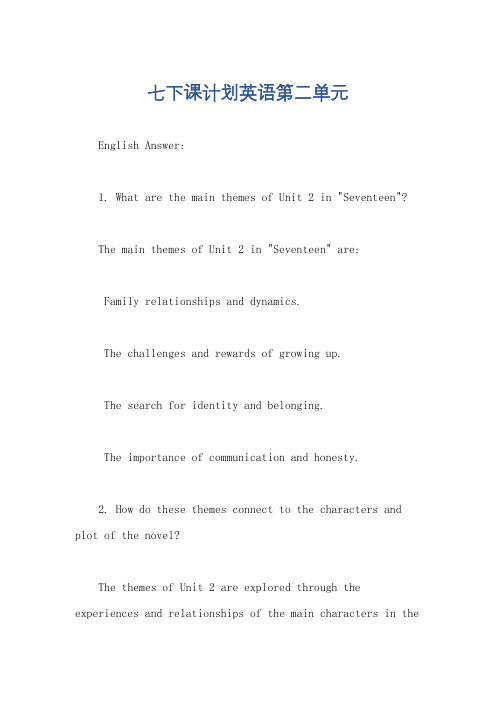
七下课计划英语第二单元English Answer:1. What are the main themes of Unit 2 in "Seventeen"?The main themes of Unit 2 in "Seventeen" are:Family relationships and dynamics.The challenges and rewards of growing up.The search for identity and belonging.The importance of communication and honesty.2. How do these themes connect to the characters and plot of the novel?The themes of Unit 2 are explored through the experiences and relationships of the main characters in thenovel, including:Natalie: Natalie struggles with her family relationships, particularly with her mother, and is searching for her own identity and place in the world.Travis: Travis is a popular and confident teenager, but he is also dealing with his own personal challenges, including his relationship with his father.Libby: Libby is a compassionate and intelligent girl, but she is also struggling with her own self-esteem and body image issues.Keith: Keith is an ambitious and driven young man, but he is also struggling to balance his personal life with his academic pursuits.3. How do the characters grow and change throughout the unit?Throughout Unit 2, the characters in "Seventeen"undergo significant growth and change.Natalie: Natalie becomes more independent and self-assured, and she learns to stand up for herself and her beliefs.Travis: Travis learns to be more compassionate and understanding, and he develops a stronger relationship with his father.Libby: Libby learns to accept and love herself for who she is, and she develops a stronger sense of self-worth.Keith: Keith learns to prioritize his personal relationships and to find a better balance between his academic and extracurricular activities.4. What are some of the key moments or events that shape the characters' development?Some of the key moments or events that shape the characters' development in Unit 2 include:Natalie's fight with her mother: This event forces Natalie to confront her feelings about her family and to start to develop her own identity.Travis's relationship with his father: Travis's relationship with his father helps him to learn about himself and to develop a stronger sense of self-compassion.Libby's body image issues: Libby's struggles with body image help her to learn about the importance of self-acceptance and self-love.Keith's decision to quit the debate team: Keith's decision to quit the debate team helps him to learn about the importance of prioritizing his personal relationships.5. How do the themes and events of Unit 2 contribute to the overall message of the novel?The themes and events of Unit 2 contribute to the overall message of the novel, which is that growing up is achallenging but rewarding process, and that it is important to embrace the journey and to learn from the experiences along the way.中文回答:1. “十七岁”第二单元的主要主题是什么?“十七岁”第二单元的主要主题是:家庭关系和家庭动态。
英语六年级上第二单元教学设计5篇
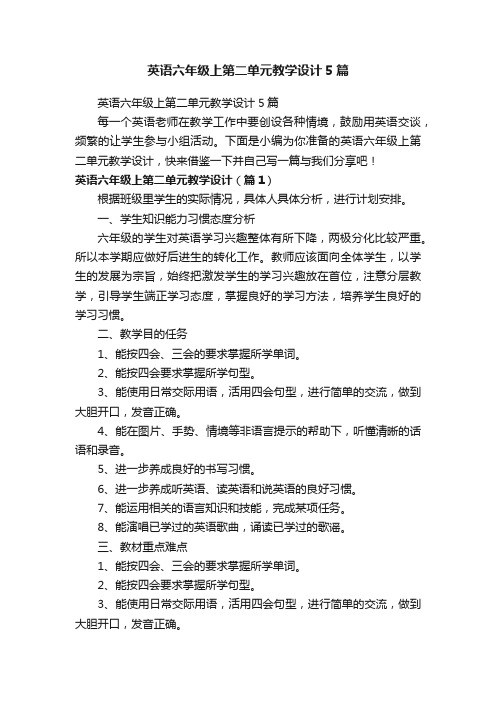
英语六年级上第二单元教学设计5篇英语六年级上第二单元教学设计5篇每一个英语老师在教学工作中要创设各种情境,鼓励用英语交谈,频繁的让学生参与小组活动。
下面是小编为你准备的英语六年级上第二单元教学设计,快来借鉴一下并自己写一篇与我们分享吧!英语六年级上第二单元教学设计(篇1)根据班级里学生的实际情况,具体人具体分析,进行计划安排。
一、学生知识能力习惯态度分析六年级的学生对英语学习兴趣整体有所下降,两极分化比较严重。
所以本学期应做好后进生的转化工作。
教师应该面向全体学生,以学生的发展为宗旨,始终把激发学生的学习兴趣放在首位,注意分层教学,引导学生端正学习态度,掌握良好的学习方法,培养学生良好的学习习惯。
二、教学目的任务1、能按四会、三会的要求掌握所学单词。
2、能按四会要求掌握所学句型。
3、能使用日常交际用语,活用四会句型,进行简单的交流,做到大胆开口,发音正确。
4、能在图片、手势、情境等非语言提示的帮助下,听懂清晰的话语和录音。
5、进一步养成良好的书写习惯。
6、进一步养成听英语、读英语和说英语的良好习惯。
7、能运用相关的语言知识和技能,完成某项任务。
8、能演唱已学过的英语歌曲,诵读已学过的歌谣。
三、教材重点难点1、能按四会、三会的要求掌握所学单词。
2、能按四会要求掌握所学句型。
3、能使用日常交际用语,活用四会句型,进行简单的交流,做到大胆开口,发音正确。
4、能在图片、手势、情境等非语言提示的帮助下,听懂清晰的话语和录音。
四、主要措施1、以活动为课堂教学的主要形式,设计丰富多彩的教学活动,让学生在乐中学、学中用,从而保证学生英语学习的可持续性发展。
2、通过听、说、读、写、唱、游、演、画、做等形式,进行大量的语言操练和练习。
3、培养学生拼读音标的能力,确保学生自主学习的质量。
4、设计全面、高效的课外作业,培养学生良好的书写习惯,做到整洁、规范、正确地书写。
英语六年级上第二单元教学设计(篇2)一、学生基本情况分析六年级共有学生11人,其中学特困生1人,其他均属于中等生,没有学优生。
人教小学英语四年级上册第二单元教学计划
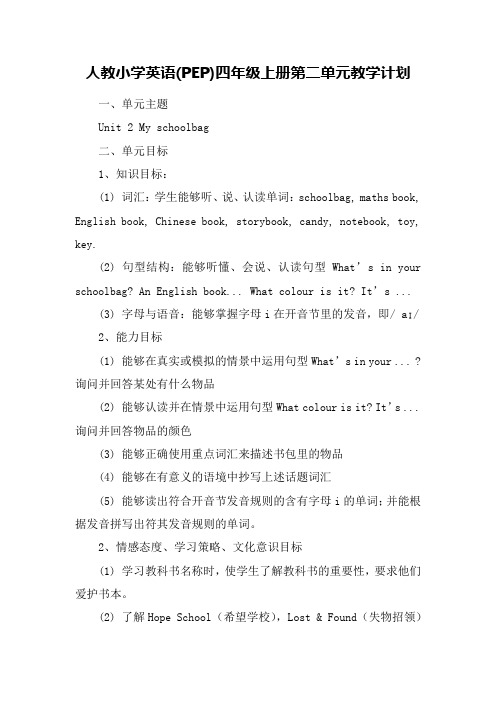
人教小学英语(PEP)四年级上册第二单元教学计划一、单元主题Unit 2 My schoolbag二、单元目标1、知识目标:(1) 词汇:学生能够听、说、认读单词:schoolbag, maths book, English book, Chinese book, storybook, candy, notebook, toy, key.(2) 句型结构:能够听懂、会说、认读句型What’s in your schoolbag? An English book... What colour is it? It’s ...(3) 字母与语音:能够掌握字母i在开音节里的发音,即/ aɪ/2、能力目标(1) 能够在真实或模拟的情景中运用句型What’s in your ... ? 询问并回答某处有什么物品(2) 能够认读并在情景中运用句型What colour is it? It’s ... 询问并回答物品的颜色(3) 能够正确使用重点词汇来描述书包里的物品(4) 能够在有意义的语境中抄写上述话题词汇(5) 能够读出符合开音节发音规则的含有字母i的单词;并能根据发音拼写出符其发音规则的单词。
2、情感态度、学习策略、文化意识目标(1) 学习教科书名称时,使学生了解教科书的重要性,要求他们爱护书本。
(2) 了解Hope School(希望学校),Lost & Found(失物招领)的意思。
(3) 能够根据i在开音节里的发音规则拼读单词,并能够根据其发音规则拼写单词。
(4)学会合作交流。
三、单元重难点1、教学重点(1)能够听、说、认读单词:schoolbag, maths book, English book, Chinese book, storybook, candy, notebook, toy, key.(2) 能够听懂、会说句型What’s in your schoolbag? An English book... What colour is it? It’s ...(3) 能够正确使用重点词汇来描述书包里的物品。
一年级上册英语第二单元周教学计划

一年级上册英语第二单元周教学计划全文共5篇示例,供读者参考一年级上册英语第二单元周教学计划1一、教学分析的基本情况:1、学生分析:一年级的孩子刚接触英语半个学期。
他们学习兴趣浓厚,接受和模仿能力强,学习习惯初步形成。
然而,由于他们的年龄,他们的注意力很容易分散。
所以这学期还是要培养学生良好的学习习惯和听说能力。
2、教材分析高一下学期有六个单元,分别是:单元1男生,单元2食物,单元3 rinks,单元4身体,单元5运动,单元unit6happytime。
每个单元包括让我们滑动并说,让我们滑动,让我们滑动,让我们滑动并编号,让我们滑动并匹配,让我们滑动并拖动,让我们跟踪和平,让我们滑动,等等。
重要的东西包括一些对话,日常交流用语,一些比较简单的指令性语言文字,穿插一些娱乐性的游戏。
二、指导思想贯彻“天天自信,天天向上”的理念,坚持以德育为先,以教学为中心的原则,围绕提高学校效率和质量的主题,狠抓日常教学,推进课程改革,加强教育和科研,全面推进素质教育,坚持教学、服务和管理,与时俱进,进一步提高教育质量,积极推动我校教育教学工作健康发展,为教育事业做出应有的贡献。
三、教学目标:1、通过学习,学生可以理解和说出一些简单的日常交流术语,并在情景中使用。
2、使学生掌握一定数量的单词,掌握新单词的读音、写法和汉语意思。
3、通过歌曲、游戏、歌谣、游戏、制作等活动巩固所学知识,培养学生学习英语的兴趣四、教材的重点和难点:教学的重点:1、能听懂老师的指令并做出正确的反应,能看简单的故事,能唱课本上出现的歌曲和民谣。
2、熟练使用英语进行简单的日常交流和对话,养成良好的英语学习习惯。
教学难点:1、在游戏教学中,学生可以体验生活,享受生活和学习的快乐。
2、它可以贴近儿童生活,满足学生的兴趣和需求,使学生在生活化的课堂教学中发展学生的综合语言应用能力。
五、教学措施1、让学生明白现代语言的重要性。
明明学习是为了适应时代的需要。
Unit2-Ways-to-go-to-school单元教学计划
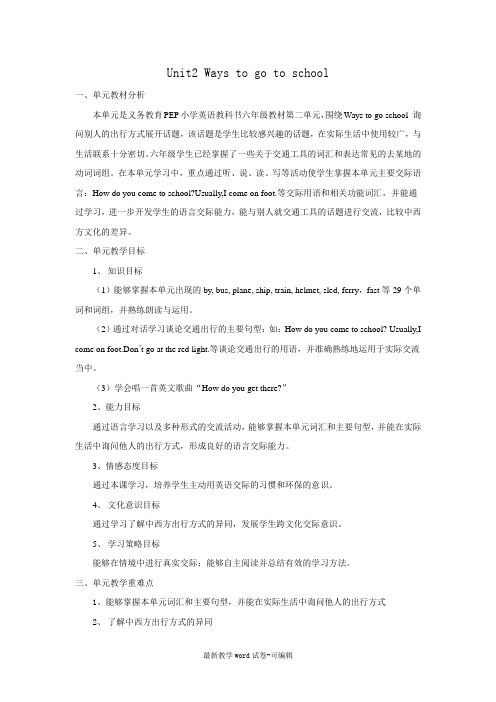
Unit2 Ways to go to school一、单元教材分析本单元是义务教育PEP小学英语教科书六年级教材第二单元,围绕Ways to go school 询问别人的出行方式展开话题,该话题是学生比较感兴趣的话题,在实际生活中使用较广,与生活联系十分密切。
六年级学生已经掌握了一些关于交通工具的词汇和表达常见的去某地的动词词组。
在本单元学习中,重点通过听、说、读、写等活动使学生掌握本单元主要交际语言:How do you come to school?Usually,I come on foot.等交际用语和相关功能词汇,并能通过学习,进一步开发学生的语言交际能力,能与别人就交通工具的话题进行交流,比较中西方文化的差异。
二、单元教学目标1、知识目标(1)能够掌握本单元出现的by, bus, plane, ship, train, helmet, sled, ferry,fast等29个单词和词组,并熟练朗读与运用。
(2)通过对话学习谈论交通出行的主要句型:如:How do you come to school? Usually,I come on foot.Don’t go at the red light.等谈论交通出行的用语,并准确熟练地运用于实际交流当中。
(3)学会唱一首英文歌曲“How do you get there?”2、能力目标通过语言学习以及多种形式的交流活动,能够掌握本单元词汇和主要句型,并能在实际生活中询问他人的出行方式,形成良好的语言交际能力。
3、情感态度目标通过本课学习,培养学生主动用英语交际的习惯和环保的意识。
4、文化意识目标通过学习了解中西方出行方式的异同,发展学生跨文化交际意识。
5、学习策略目标能够在情境中进行真实交际;能够自主阅读并总结有效的学习方法。
三、单元教学重难点1、能够掌握本单元词汇和主要句型,并能在实际生活中询问他人的出行方式2、了解中西方出行方式的异同三、单元课时安排本单元安排六课时新授,两课时练习,合计八课时左右完成。
一年级上册英语第二单元周教学计划
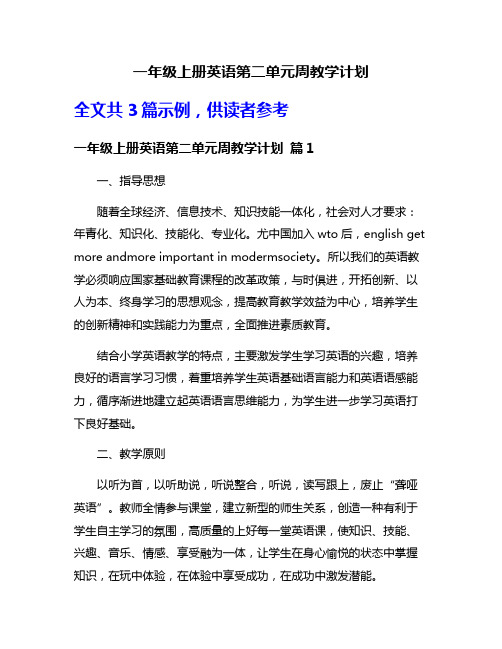
一年级上册英语第二单元周教学计划全文共3篇示例,供读者参考一年级上册英语第二单元周教学计划篇1一、指导思想随着全球经济、信息技术、知识技能一体化,社会对人才要求:年青化、知识化、技能化、专业化。
尤中国加入wto后,english get more andmore important in modermsociety。
所以我们的英语教学必须响应国家基础教育课程的改革政策,与时俱进,开拓创新、以人为本、终身学习的思想观念,提高教育教学效益为中心,培养学生的创新精神和实践能力为重点,全面推进素质教育。
结合小学英语教学的特点,主要激发学生学习英语的兴趣,培养良好的语言学习习惯,着重培养学生英语基础语言能力和英语语感能力,循序渐进地建立起英语语言思维能力,为学生进一步学习英语打下良好基础。
二、教学原则以听为首,以听助说,听说整合,听说,读写跟上,废止“聋哑英语”。
教师全情参与课堂,建立新型的师生关系,创造一种有利于学生自主学习的氛围,高质量的上好每一堂英语课,使知识、技能、兴趣、音乐、情感、享受融为一体,让学生在身心愉悦的状态中掌握知识,在玩中体验,在体验中享受成功,在成功中激发潜能。
三、学生基本情况分析一年级学生共人,是整个年级中学生最多的一个年级,学生上课时的控制能力差和思想注意力不集中,且学生刚接触学习英语,对英语学习没有基础,所以教学难度很大。
少数学生在学前班学过一点,但大部分学生没有接触过英语,所以在今后的教学中,应面向全体生,激发学生学习英语的兴趣,充分调动他们的自主能动性、积极性,并发挥团队协作精神,营造互帮互助,共同学习英语的语境。
四、教材分析此套教材new standenglish,全书共分13个模块(module)。
每个模块分三个单元(unit),第一单元呈现本模块所要学习的语言内容,第二和第三单元提供若干任务型(task-based)练习,包括歌谣和小诗。
通过对歌谣和小诗的学习,一是培养学生的语感和节奏感;第二是提高发音的正确性;第三通过这些英语国家儿童所熟知的歌谣,介绍一定的西方文化。
教学工作计划四上英语第二单元
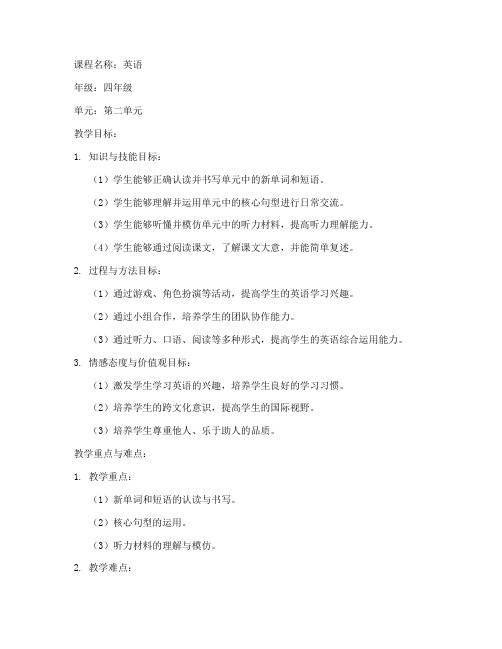
课程名称:英语年级:四年级单元:第二单元教学目标:1. 知识与技能目标:(1)学生能够正确认读并书写单元中的新单词和短语。
(2)学生能够理解并运用单元中的核心句型进行日常交流。
(3)学生能够听懂并模仿单元中的听力材料,提高听力理解能力。
(4)学生能够通过阅读课文,了解课文大意,并能简单复述。
2. 过程与方法目标:(1)通过游戏、角色扮演等活动,提高学生的英语学习兴趣。
(2)通过小组合作,培养学生的团队协作能力。
(3)通过听力、口语、阅读等多种形式,提高学生的英语综合运用能力。
3. 情感态度与价值观目标:(1)激发学生学习英语的兴趣,培养学生良好的学习习惯。
(2)培养学生的跨文化意识,提高学生的国际视野。
(3)培养学生尊重他人、乐于助人的品质。
教学重点与难点:1. 教学重点:(1)新单词和短语的认读与书写。
(2)核心句型的运用。
(3)听力材料的理解与模仿。
2. 教学难点:(1)学生对新单词和短语的记忆与运用。
(2)学生在实际交流中运用核心句型的能力。
(3)学生在阅读课文时对文章大意的理解。
教学进度安排:第一周:1. 课前准备:教师准备教学课件、单词卡片、实物教具等。
2. 课堂教学:(1)导入:通过歌曲、游戏等活动,激发学生的学习兴趣。
(2)新单词和短语的认读与书写。
(3)核心句型的讲解与练习。
(4)听力材料的听写与讲解。
第二周:1. 课前准备:教师准备教学课件、单词卡片、实物教具等。
2. 课堂教学:(1)复习上周所学内容。
(2)角色扮演,巩固核心句型的运用。
(3)小组合作,进行情景对话练习。
(4)阅读课文,了解课文大意。
第三周:1. 课前准备:教师准备教学课件、单词卡片、实物教具等。
2. 课堂教学:(1)复习上周所学内容。
(2)听力材料的听写与讲解。
(3)小组合作,进行角色扮演活动。
(4)总结单元重点,布置课后作业。
第四周:1. 课前准备:教师准备教学课件、单词卡片、实物教具等。
2. 课堂教学:(1)复习单元所学内容。
五年级下册英语精通版第二单元计划
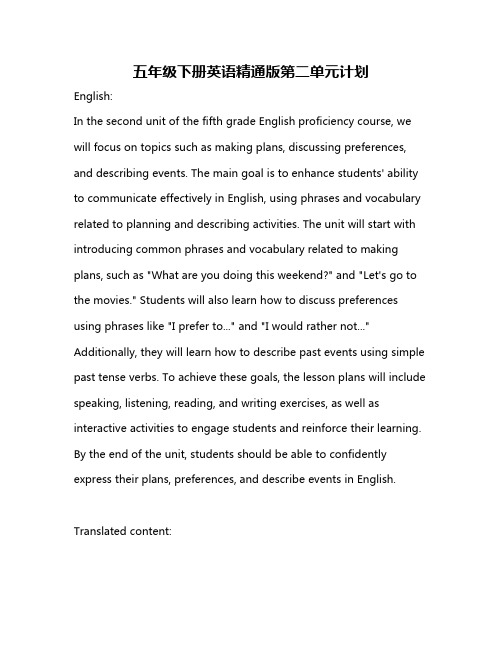
五年级下册英语精通版第二单元计划English:In the second unit of the fifth grade English proficiency course, we will focus on topics such as making plans, discussing preferences, and describing events. The main goal is to enhance students' ability to communicate effectively in English, using phrases and vocabulary related to planning and describing activities. The unit will start with introducing common phrases and vocabulary related to making plans, such as "What are you doing this weekend?" and "Let's go to the movies." Students will also learn how to discuss preferences using phrases like "I prefer to..." and "I would rather not..." Additionally, they will learn how to describe past events using simple past tense verbs. To achieve these goals, the lesson plans will include speaking, listening, reading, and writing exercises, as well as interactive activities to engage students and reinforce their learning. By the end of the unit, students should be able to confidently express their plans, preferences, and describe events in English.Translated content:在五年级英语精通版的第二单元中,我们将重点关注制定计划、讨论偏好和描述事件等主题。
英语第二单元星期计划短文
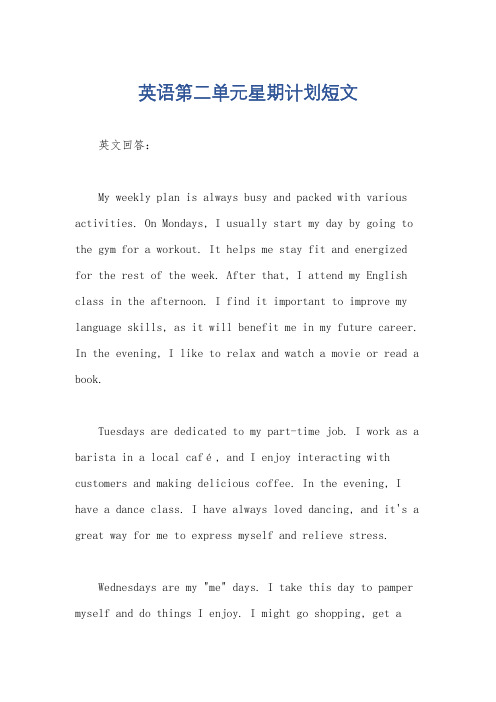
英语第二单元星期计划短文英文回答:My weekly plan is always busy and packed with various activities. On Mondays, I usually start my day by going to the gym for a workout. It helps me stay fit and energized for the rest of the week. After that, I attend my English class in the afternoon. I find it important to improve my language skills, as it will benefit me in my future career. In the evening, I like to relax and watch a movie or read a book.Tuesdays are dedicated to my part-time job. I work as a barista in a local café, and I enj oy interacting with customers and making delicious coffee. In the evening, I have a dance class. I have always loved dancing, and it's a great way for me to express myself and relieve stress.Wednesdays are my "me" days. I take this day to pamper myself and do things I enjoy. I might go shopping, get amassage, or spend time with friends. It's important to take care of oneself and indulge in some self-care activities.Thursdays are dedicated to my studies. I spend the whole day at the library, working on assignments and preparing for exams. It can be challenging, but I know that hard work pays off in the end. In the evening, I have a cooking class. I love trying out new recipes and expanding my culinary skills.Fridays are all about socializing. I meet up with friends for lunch or dinner, go to parties, or attend events happening in the city. It's a great way to unwind and have some fun after a long week.Saturdays and Sundays are my days off. I use this time to relax, catch up on sleep, and spend quality time with my family. We might go for a picnic, have a barbecue, or go on a day trip to a nearby city. It's important to balance work and leisure time to maintain a healthy lifestyle.中文回答:我的每周计划总是忙碌而充实,安排了各种各样的活动。
四年级下册英语,第二单元时间课程计划表
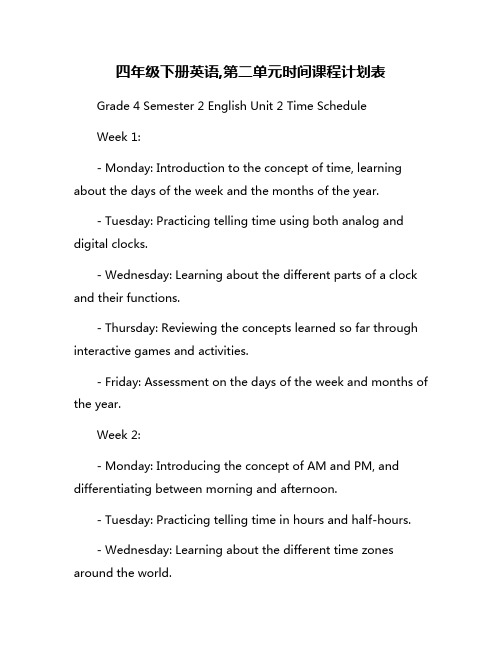
四年级下册英语,第二单元时间课程计划表Grade 4 Semester 2 English Unit 2 Time ScheduleWeek 1:- Monday: Introduction to the concept of time, learning about the days of the week and the months of the year.- Tuesday: Practicing telling time using both analog and digital clocks.- Wednesday: Learning about the different parts of a clock and their functions.- Thursday: Reviewing the concepts learned so far through interactive games and activities.- Friday: Assessment on the days of the week and months of the year.Week 2:- Monday: Introducing the concept of AM and PM, and differentiating between morning and afternoon.- Tuesday: Practicing telling time in hours and half-hours.- Wednesday: Learning about the different time zones around the world.- Thursday: Reviewing and practicing telling time using various activities.- Friday: Assessment on telling time in hours and half-hours.Week 3:- Monday: Introducing the concept of quarter-past and quarter-to, and practicing telling time using these intervals.- Tuesday: Learning about the concept of elapsed time and calculating time intervals.- Wednesday: Practicing telling time with both analog and digital clocks.- Thursday: Reviewing and consolidating the concepts learned so far.- Friday: Assessment on the concept of quarter-past, quarter-to, and elapsed time.Week 4:- Monday: Introducing the concept of minutes and practicing telling time in minutes.- Tuesday: Learning about the 24-hour clock and practicing telling time in this format.- Wednesday: Reviewing and consolidating the concepts of telling time in various intervals.- Thursday: Engaging in practical activities related to time, such as planning daily schedules.- Friday: Assessment on telling time in minutes and the24-hour clock.Week 5:- Monday: Introducing the concept of A.M. and P.M. and practicing telling time in both formats.- Tuesday: Learning about the concept of digital and analog clocks and the differences between them.- Wednesday: Reviewing and practicing all the concepts learned throughout the unit.- Thursday: Engaging in group activities and games to reinforce learning.- Friday: Final assessment on all the concepts learned in Unit 2.By following this time schedule, students will have a thorough understanding of the concept of time and be proficient in telling time in various formats by the end of the unit.。
人教版七年级初中一年级英语第二单元教学计划及教学重点难点

初中一年级英语第二单元教学计划及教学重点难点一、教学目标(一)语言知识目标1. 学生能准确认读、拼写并运用本单元重点单词,如father, mother, parent, brother, sister, grandparent, family, those, these, who, they, well, have, day, bye 等。
2. 掌握重点句型“—Who's he/she? —He's/She's... —Are those your...? —Yes, they are. / No, they aren't.”,并能在情境中熟练运用。
3. 理解和掌握指示代词this, that, these, those 的用法以及一般疑问句中复数形式的构成和回答。
(二)语言技能目标1. 听:能听懂有关家庭成员介绍和询问的简单对话,识别关键词汇和句型。
2. 说:能够运用所学单词和句型,清晰、流畅地介绍自己的家庭成员,询问他人关于家庭成员的信息,语音、语调自然。
3. 读:能正确、流利地朗读本单元课文,理解大意,获取有关家庭成员的具体信息。
4. 写:可以正确书写本单元重点单词和句型,能够仿照范例写出简单的介绍家庭成员的短文。
(三)情感态度目标1. 培养学生热爱家庭、尊重家庭成员的情感,引导学生关注家庭文化。
2. 通过自我介绍和相互交流,增进学生之间的了解和友谊,培养学生的团队合作精神。
(四)文化意识目标了解中西方家庭文化的差异,如家庭成员称呼的不同、家庭结构的差异等。
二、教学重难点(一)教学重点1. 词汇:掌握与家庭成员相关的一系列单词,注意单词发音和拼写的准确性,如grandparents(复数形式)、parent(与parents 的区别)等。
2. 句型:熟练运用询问和介绍家庭成员的句型,包括对不同性别、单复数的正确表达。
3. 语法:理解指示代词this/that(单数)和these/those(复数)在句中的用法,掌握一般疑问句及其回答(尤其是复数形式)。
- 1、下载文档前请自行甄别文档内容的完整性,平台不提供额外的编辑、内容补充、找答案等附加服务。
- 2、"仅部分预览"的文档,不可在线预览部分如存在完整性等问题,可反馈申请退款(可完整预览的文档不适用该条件!)。
- 3、如文档侵犯您的权益,请联系客服反馈,我们会尽快为您处理(人工客服工作时间:9:00-18:30)。
英语第二单元计划
本单元学习的主题是上周末活动安排。
主情景图通过展示Mike 和 John 上周末的活动呈现本单元要学习的核心词汇和句型。
本单元知识与能力目标:
能够听、说、读、写句型:How was your weekend ? It was good . What did you do ? I stayed at home with you r grandma . Was it interesting ? Did you see a film ? No, I had a cold . 能够在情景中恰当运用以下句型提问并回答有关周末活动的安排:How was your weekend ? It was good . What did you do last weekend ? Did you see a film ? Did you do anything else ?
能够听、说、读、写单词:cleaned my room , washed my clothes , stayed at home , watched TV ,read a book , saw a film , had a cold , slept .
能够正确使用上述单词和词组谈论过去的活动。
理解一般过去用法及动词词尾的规则变化。
情感态度、文化意识、学习策略目标:
了解英国人有喝下午茶的生活习惯。
培养学生合理安排周末活动的意识。
